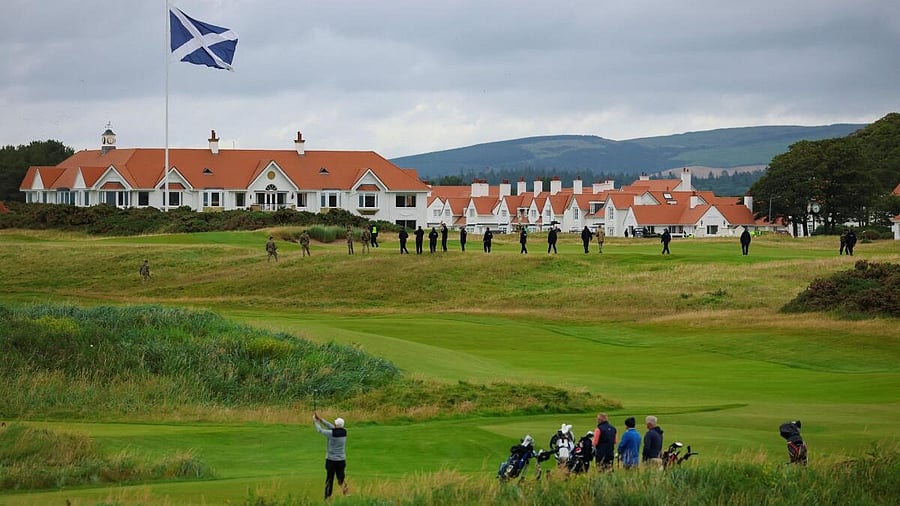
Security personnel check the Trump Turnberry resort golf course, during U.S. President Donald Trump's visit to Scotland, in Turnberry, Scotland, Britain, July 26, 2025.
Credit: Reuters Photo
London: On a sunny June morning eight years ago, Donald Trump arrived at his golf resort in Scotland, the day after Britain voted to leave the European Union. At that time, he took credit for predicting Brexit and said it foretold victory in the insurgent presidential campaign he was mounting back home.
On Friday, as a second-term president, Trump returned to that resort, Trump Turnberry, with a good part of what he said in 2016 now a reality.
He had correctly claimed that the political forces that drove Brexit went beyond a single country. Five months after that visit, Trump captured the White House, having played to anxieties about immigration in ways that echoed the "Vote Leave" campaign.
Yet in Britain, history has diverged from Trump's vision in important respects. Polls show that close to 60% of Britons now believe Brexit was a mistake. Prime Minister Keir Starmer has made mending relations with the European Union one of the priorities of his Labour government.
The populist wave that Trump predicted would wash across Europe has ebbed and flowed, leaving a fragmented political landscape with a handful of populist leaders whose fortunes are mixed. Prime Minister Giorgia Meloni of Italy is on the rise, but Prime Minister Viktor Orban of Hungary is struggling.
"Populism is still a relatively limited phenomenon," said Kim Darroch, who was Britain's ambassador to the United States during Trump's first term. "Brexit happened, but it's very hard to argue, even by its most ardent proponents, that it has been anything other than a comprehensive disaster."
Still, in retrospect, he said, Trump's 2016 visit came at a "turning point in history, and we haven't seen how it's all going to work out."
Darroch recalled that British officials were nervous that Trump, who had long been vocal about his support for Brexit, would land in Scotland before the vote rather than after it. With the polls showing a narrow margin, they worried that he would throw his support to the Vote Leave campaign at a critical moment.
As it happened, the Brexiteers did not need Trump, winning by 51.9% to 48.1%. On that Friday morning, as a dazed Britain digested the implications of Brexit, he played the role of cheerleader and political analyst.
"I said this was going to happen, and I think it's great thing," Trump said, as he emerged from a helicopter to the serenading of bagpipers.
"Basically, they took back their country," he told an audience that included journalists and greenskeepers from the resort. "People want to take their country back, they want to have independence in a sense, and you're going to have more than just, in my opinion, more than just what happened last night. You're going to have many other cases where people want to take their borders back."
Trump said he saw a "big parallel" between Brexit and his candidacy. That view has been endorsed by political analysts, who regard the referendum as a canary in a coal mine for Trump's victory over Hillary Clinton.
In many ways, Scotland was the wrong place for Trump's message. Scots voted by a wide margin to remain in the European Union. Two years earlier, in 2014, they had voted in a referendum to stay part of the United Kingdom. "He was talking to the nonconverted," Darroch said.
Today, the regret about Brexit extends beyond Scotland. In a poll last month by the market research firm YouGov, 56 per cent of people said leaving the European Union was a mistake, while only 31 per cent said it was the right decision.
Britain cycled through four Conservative prime ministers in the upheaval that followed the vote. Last July, the Tories were swept out of power by Starmer's Labour Party. Trump remains stubbornly unpopular in Britain, particularly in Scotland, where he is viewed as an unreliable investor who clashed with neighbors at his other resort, Trump International Scotland, north of Aberdeen.
But having returned to power, he is a commanding figure on the world stage. King Charles III has invited him to make a rare second state visit in September. And Starmer has assiduously cultivated him. He will visit the president at Turnberry on Monday before flying with him to Aberdeen.
Trump has said little about the waning popularity of Brexit, preferring to focus on the trade deal he struck with Starmer in May. The president will even roll out the welcome mat for the European Union this time around, meeting Sunday with Ursula von der Leyen, the president of the European Commission, to discuss trade negotiations between the United States and the EU.
It was not clear whether Trump would meet with Nigel Farage, the leader of the anti-immigrant party, Reform UK, during this visit. Farage is his most conspicuous political ally in Britain and has ridden Trump's antiestablishment mantra to new prominence.
Regardless of whether that prompts Trump to take another victory lap this weekend, his defenders argue that the rise of Reform UK shows that the essence of his populist message has been validated in Britain.
"All the push-polls in Christendom won't change the fact that the U.K. has its sovereignty back and they will never rejoin the EU," said Steve Bannon, a former chief strategist to Trump.